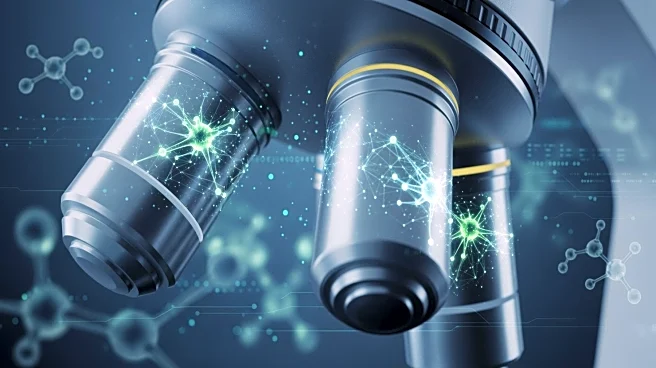What's Happening?
A new machine learning model, CarbaDetector, has been developed to improve the detection of carbapenemase-producing Enterobacterales using disk diffusion tests. This AI-based tool aims to accurately predict
the presence of carbapenemases by analyzing inhibition zone diameters, a method commonly used in susceptibility testing. The model demonstrates a high sensitivity of 96.6% and a significantly improved specificity of 85.0%, compared to traditional methods. This advancement could reduce the need for confirmatory tests, particularly in resource-limited settings. CarbaDetector has been tested on datasets from multiple countries and shows promise even with incomplete data sets.
Why It's Important?
The development of CarbaDetector is significant for the healthcare industry, particularly in the field of microbiology and infectious disease control. By increasing the specificity of carbapenemase detection, the model can potentially reduce the number of unnecessary confirmatory tests, saving time and resources in clinical laboratories. This is especially crucial in settings with limited resources, where efficient use of laboratory tests is essential. The model's ability to work with incomplete data sets further enhances its applicability in diverse clinical environments. As antibiotic resistance continues to be a major public health challenge, tools like CarbaDetector could play a vital role in managing and controlling the spread of resistant bacterial strains.
What's Next?
Future developments of CarbaDetector will focus on expanding its dataset to include a wider variety of bacterial species and resistance mechanisms. This expansion aims to improve the model's accuracy and applicability across different geographical regions. Additionally, the inclusion of more antibiotics in the testing process is planned to enhance the model's usability. As the model evolves, it may also be able to predict specific categories of carbapenemases, further reducing the need for additional testing. These advancements could lead to broader adoption of CarbaDetector in clinical settings worldwide.
Beyond the Headlines
The introduction of AI in bacterial resistance detection highlights the growing intersection of technology and healthcare. CarbaDetector's development underscores the potential of machine learning to address complex medical challenges, such as antibiotic resistance. This innovation not only improves diagnostic accuracy but also represents a shift towards more data-driven approaches in healthcare. As AI continues to advance, its integration into medical diagnostics could lead to more personalized and efficient patient care.











